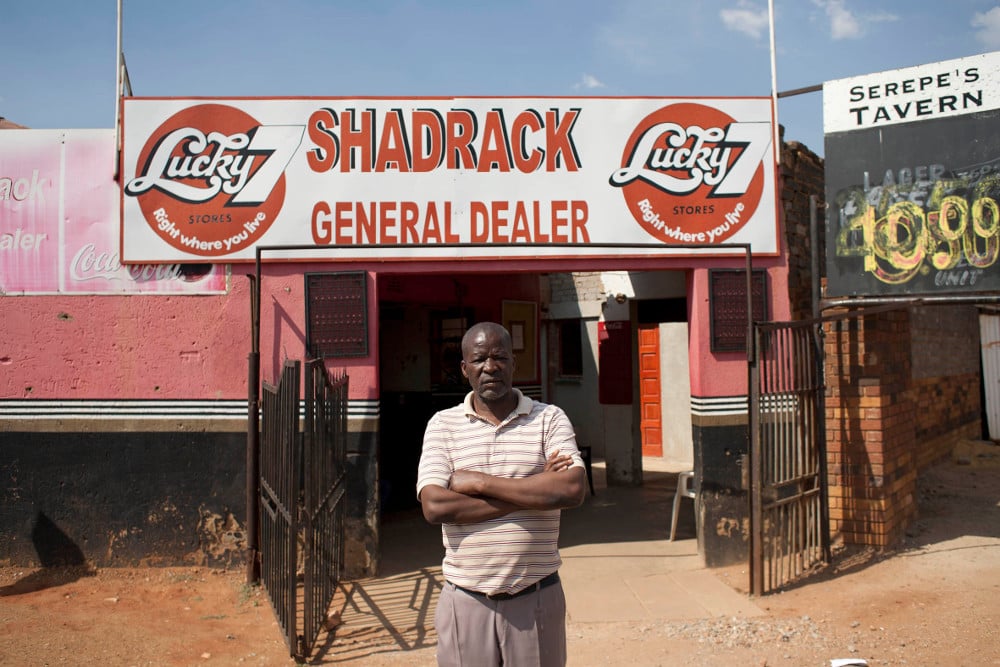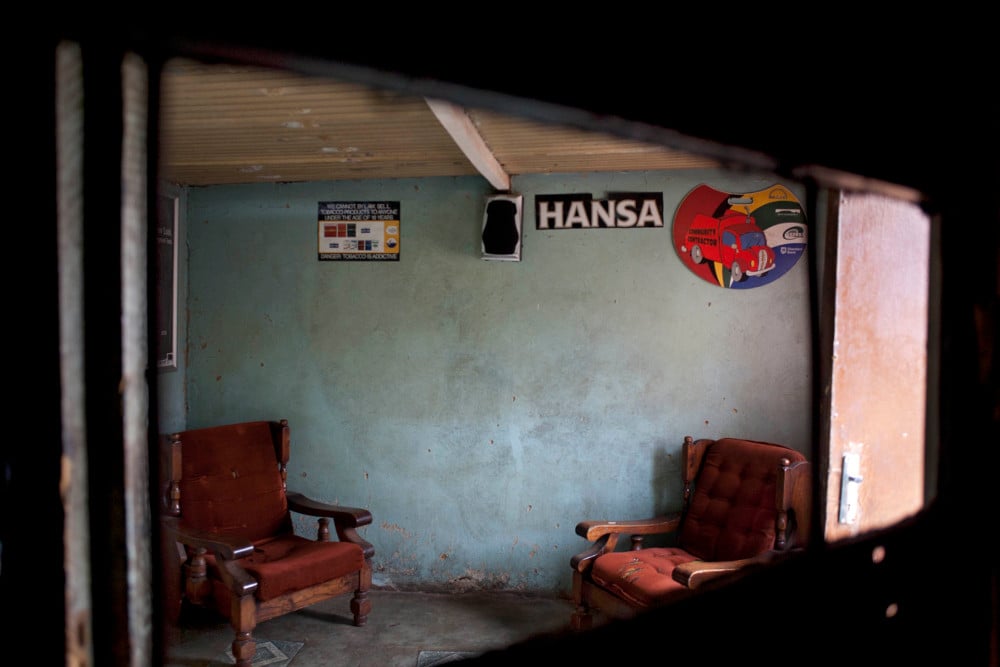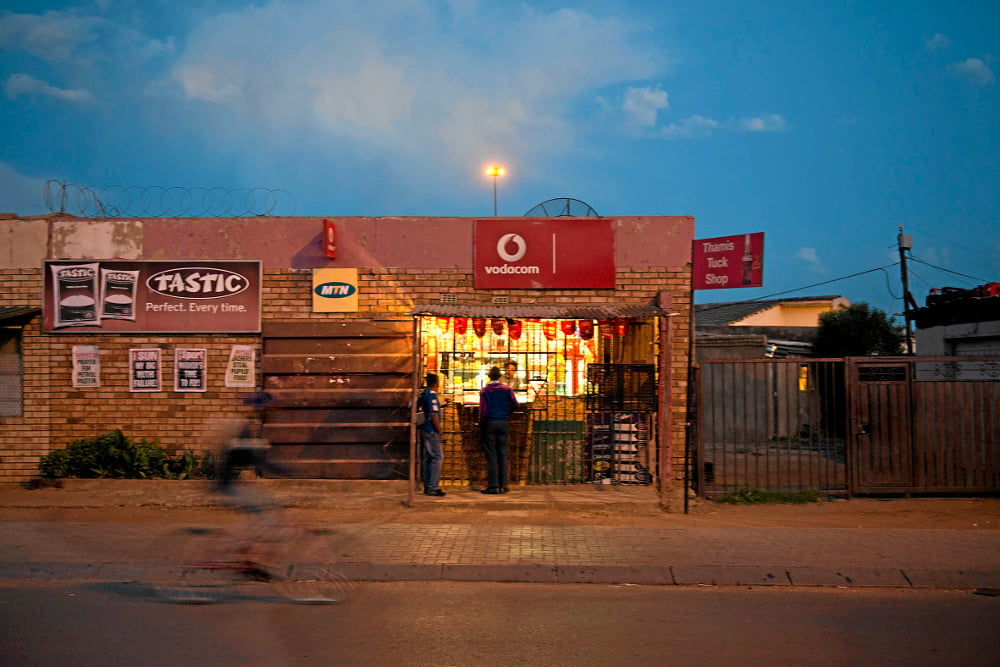Shahin opens his shop at 6am and closes at 9.30pm.
The name on the red Coca-Cola signboard says it is Thami’s store, but the squat spaza shop now belongs to Shahin. Originally from Bangladesh, he is reluctant to give his surname.
He serves his customers from inside his three-by-three-metre shop through metal bars. There is a tiny gap through which only one sold item can fit. “I can’t trust them. They know I am not from here,” says Shahin, the victim of a number of burglaries. “I even have to lock up the whole store when I go to the toilet.”
Shahin’s is one of a number of spaza shops that sell bread, milk, eggs and sweets in the heart of Katlehong, 35km east of Johannesburg. These spazas, all owned by Pakistani and Bangladeshi traders, are located in the busiest section of the township. Their tiny shops are near a shopping complex that hosts a Shoprite retail store, a Chicken Licken franchise and an Engen garage with a convenience store.
Shahin has lived in South Africa for three years. The only way for him and his brothers to survive was to open a trading store. When asked how local spaza owners treat him, he shakes his head: “They say we steal their customers, but I don’t force anyone to come to me. I sell good products; people come to me to buy. It is competition; it is like this everywhere around the world.”
Shahin opens his shop at 6am and closes after 9.30pm, “depending on when the last customer comes after the Shoprite has closed”.
The Mail & Guardian drives to nearby First Avenue to find out how Shadrack Serepe (60) is coping with the increased competition. He opened his spaza shop in 1988 and his sons run their own shops in different sections of the township.
“Business was better during apartheid,” says Serepe, shaking his head. “There were inspectors that used to come and check who was running the business and what was sold. There were no foreigners who could just come here and start a shop. Now there’s one at every corner and at least three per street. Our government has let us down.”
‘Open to everyone’
Serepe says, under apartheid, people were discouraged from starting businesses in townships other than the one in which they lived, allowing small enterprises to flourish.
Now, however, he says South Africa’s “open to everyone” immigration policies have grossly undermined the local informal trading industry, forcing many locally owned spaza shops to close down. “Look,” Serepe says, gesturing around his spaza shop. “There is nothing.”
A counter separates him and his customers; on top of it is his cash register. Gospel and traditional Sesotho music blare from the radio.

Shadrack Serepe’s tavern subsidises his tuck shop. (Photos: Oupa Nkosi, M&G)
There are two fridges: one with soft drinks, the other stacked with quarts of beer. “I’m one of the lucky few that has a liquor licence, otherwise I would have been forced to close down a long time ago. These foreigners just sell everything so cheap and everyone goes to them. I can’t sell fresh food any more,” Serepe says.
When asked what effect the nearby retailers have had on his business, he says: “Nothing; they haven’t impacted on me at all. But it’s these foreigners, these Pakistanis and Somalis – they are the ones who have taken my customers.”
‘How the world operates’
Around the corner, less than 200m away, is another Bangladeshi-owned shop. Muhammed (who also did not want his surname disclosed) has been in South Africa for three years. “They need to deal with them [our spazas]. This is how the world operates,” he says.
Secured with steel bars, chains and a security door, his tiny spaza is packed to capacity with goods. Muhammed says the locals need to learn how to run a successful business.”When Shoprite charges R12.50 for Albany [bread], I charge R11.50,” he explains. “For the cigarette it charges R2.50; I charge R2. And I sell on credit.”

A local shop owner sells liquor without a licence to get by.
In March 2012, ahead of the ANC’s Mangaung conference, the Western Cape ANC proposed that non-South Africans should not run spaza shops without adhering to certain rules that would not apply to locals. A party discussion document called for a “strengthening and proper enforcement of municipal bylaws”.
ANC economic policy head Enoch Godongwana said that, although the proposal was shelved, it was again being raised by party structures, and was “going to be a major issue at the national general council next year”.
At the time, refugee rights group Passop (People Against Suffering, Oppression and Poverty) described the “anti-immigration” proposals as “unconstitutional” and “foolish”. Passop’s Braam Hanekom said he was shocked that the ANC had indicated it would support the document.
“The spaza shop owners feed these communities; their prices are the cheapest,” said Hanekom. He added that “the ANC seems to be more concerned about the businessmen and elites in the townships and not the poor families who depend on the foreign-owned spaza shops for cheaper loaves of bread and cups of rice”.
Treatment of foreigners
The African Centre for Migration and Society at the University of the Witwatersrand has done extensive research on the treatment of foreign shop owners. Attacks on foreign entrepreneurs are almost always triggered either by business cartels or business owners who want to get rid of the competition, or by local leaders who want the goods in those shops to be distributed to their supporters, said the centre’s director, Loren Landau.
This seems to be the sentiment in Katlehong – which offers a snapshot of the reality in the townships – where local spaza shop owners accuse foreigners of stealing their customers. They say they have been forced to look at other ways to be sustainable.

Shahin opens his shop at 6am and closes at 9.30pm.
There are six other South African-owned spazas on First Avenue, all within 100m of one another. The M&G spoke to two of the owners, who don’t want to be named because they sell liquor without a licence.
One of them admits his business has been a front for an illicit liquor store since 2006. “Back then I used to make R5 000 a day. Now, on a good day I make R1 500 to R1 700, but that’s usually on a Saturday.”
He says the police took his stock and he had to give them R1 500 to avoid arrest. He claims one of the police officers who led the raid has his own bottle store, where he is certain his own liquor ended up.
“We know that guy, but what can you do? I don’t have a licence. I can’t compete with the foreigners, so I just have to keep a low profile. Selling alcohol is a way to compete.”
Police raids
The other shop owner, aged 58, tells how “the cops raided my place and took the nips I sold on the side. This stuff [food] doesn’t get sold.” He says the police sent someone to buy a “nip” (a small bottle) of gin. Then they came to his spaza, took all the liquor and asked him to pay R1 500 or face arrest. He opened a spaza shop after being “too old” to work at his parttime job, yet too young to receive a state pension. Like Serepe, he is unable to compete with foreign traders because they “sell their things so cheap”.
He is aware of the Bangladeshi business model of buying in bulk and employing family members and friends, paying them less than South Africans would expect. They also have low input costs, often sleeping in their shops to avoid having to pay for accommodation.
The National African Federated Chamber of Commerce (Nafcoc) launched its township monitor index report in December 2013, which said there were significant price differentials between local and foreign-owned spaza shops.
“The differentiation can be attributed to the weak buying power of spaza shop owners who, unlike the foreigners and large retailers, do not buy in bulk and therefore do not achieve the same level of discounts from their suppliers,” says Khaya Buthelezi, Nafcoc’s head of communications.
“Considering their sheer numbers, if spaza shop owners combined resources to do bulk buying, they would achieve greater supplier discounts and become highly competitive.”
Foreigners’ business methods also include “trading in kindness”: providing employees with food and accommodation in lieu of wages. This means that most of their profits are reinvested in the business.
When the M&G asked a South African shop owner why locals don’t adopt a similar model, he says: “Well, we just haven’t done it. How will it work?” – Additional reporting by Bantu Pisiwe